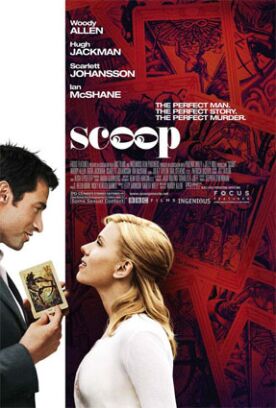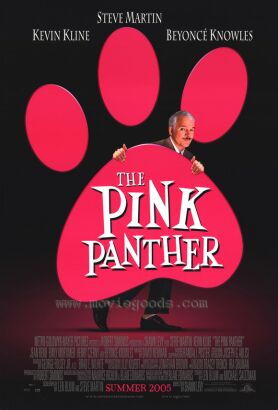Scoop
Woody Allen’s late-life film projects run heavily to self-parody, and it was perhaps his temporary escape from this with his last film, Match Point, which made it such a criticial success. I wasn’t that impressed with that film myself. Though it was a tighter and better made picture than its immediate predecessors and had no Woody-clone dragged into it from celebrity-land to make it truly awful, it nevertheless had the same nihilistic sensibility behind it that has made everything Mr Allen has done for the last decade and a half, at least, so unpleasant. “You do the best you can within the concentration camp,” he recently told an interviewer for the Washington Post with pompous absurdity. “It’s very hard to keep your spirits up. You’ve got to keep selling yourself a bill of goods, and some people are better at lying to themselves than others. If you face reality too much, it kills you.” Unfortunately, Woody is not so good as he used to be at facing away from reality. The damnable stuff — at least as he imagines it — is always creeping in and bringing with it a repugnant moral nullity.
And, to make matters worse, the Woody-clone is back. The stammering, neurotic, timid but unfunny Woody Allen surrogate played in the film by Woody Allen is a second rate American magician in London called Sid Waterman. Sid goes under the stage name of The Great Splendini and is constantly underlining his Woody-ness with a running gag in which he says to various women, with patent insincerity, “I love you from the bottom of my heart, I mean that sincerely.” It’s a reminder of the extent to which the author himself regards insincerity, like other moral failings, as merely comic. Unashamedly phony and insincere himself, he regards the film, which is even more gimcrack and slapdash in its construction than the Great Splendini’s magic tricks, as being all part of the joke. Woody is now just going through the motions, and he doesn’t care who knows it.
The worst of its sloppinesses is the relationship between Sid/Splendini, and his heroine, a nubile girl sleuth called Sondra Pransky, who is played by Scarlett Johansson. Sondra, an American journalism student in London, gets a tip about a great story from beyond the grave from a recently deceased British journalist (Ian McShane) whose spirit has been inexplicably conjured up by Sid’s disappearing woman trick when Sondra, a volunteer from the audience, is the one doing the disappearing. There is strong evidence that Peter Lyman (Hugh Jackman), a handsome and eligible British aristocrat, is a serial killer, and the journalist — who is apparently able to return from the shadowy afterlife for long enough to instruct Sondra at key moments but not for long enough to conduct the investigation himself — wants her on the story. The only thing more obscure than why he would choose as his living alter ego this scatterbrained minx who is prepared to use sex as a means to journalistic success is why she should then want to pal around with Sid as her partner in the investigation that ensues.
But that is doubtless meant to be another postmodern touch, an inside joke about the fact that the only reason in heaven or on earth for the old guy to want to hang out with the pretty young girl and join in her investigation and impersonate her father is because he is Woody Allen, making a movie on which these actions depend, not Splendini who ostensibly performs them. Likewise, the only reason for her to adopt him as her not-very-comic sidekick is because the movie is (still) a résumé enhancer for Miss Johansson, not because her character could ever have thought of such a thing on her own. It’s also significant that she is meant to be a journalist in pursuit of a story rather than a concerned citizen trying to see that justice is done. This may explain why she is prepared to sleep with Peter Lyman in order to find out the truth, but at the same time it shows us the film’s completely amoral approach not only to promiscuous sex but to murder as well.
For Mr Allen no more believes in the putatively moral impulse to catch a brutal killer than he does in his clichéd cinematic afterlife, which he has lifted from the wartime British film, Between Two Worlds, and the play by Sutton Vane, Outward Bound, on which it was based. All that he, and his heroine, care about is gratifying their own pessimism by lifting the lid on those pleasant but deceiving appearances that disguise the corruption beneath all human life. “Not everything in the world is sinister, just most things,” says Sid, lightening his Woodyish pessimism for the sake of the weak joke. “I see the glass half full,” he says later — “but with poison.” Wouldn’t half-empty, then, be the optimistic view? Never mind. Such unfunny posturing is only what you would expect from a man who professes to see his own very comfortable life as being analogous to a concentration camp. If you can swallow that much moral idiocy, you may be able to swallow this pathetically feeble film, but I don’t see why you would want to try.
Discover more from James Bowman
Subscribe to get the latest posts to your email.







